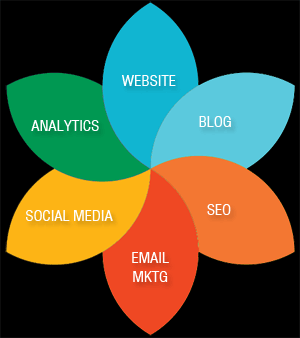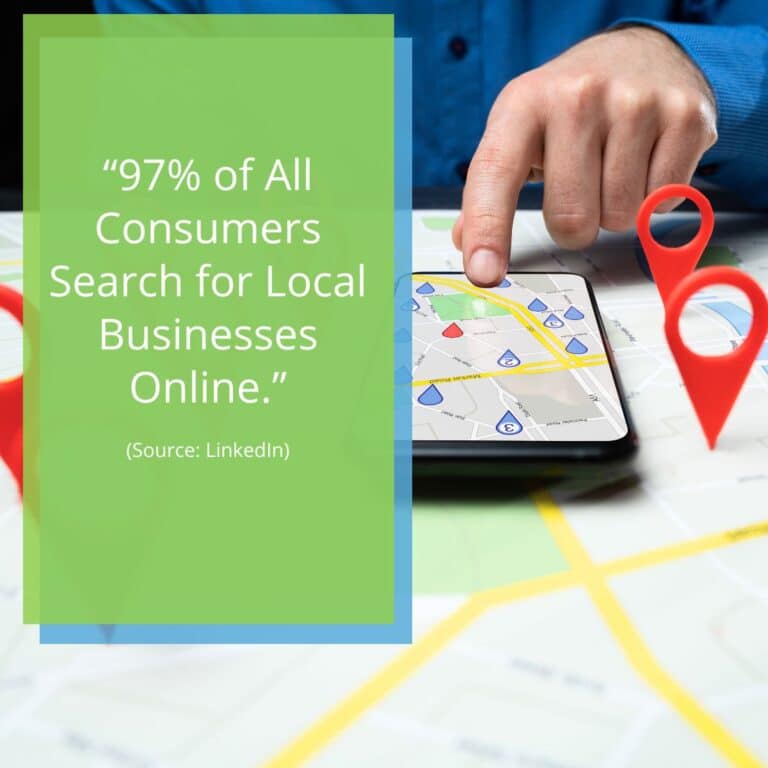In this digital age, a comprehensive online marketing strategy can help you reach increasing numbers of potential clients. When reevaluating your strategy, focus on six key components that can help fuel business growth and take your business to the next level.

1. Website Design
As the face of your company, your website design needs to be professional, clean, and easy for all visitors to navigate. When designing your website, focus on:
- Including calls to action on many pages so viewers are continually thinking about what your company can do for them.
- Optimizing the site on all browsers, including those on smart phones. The percentage of people who surf the web on smart phones and tablets is growing.
- Incorporating relevant keywords naturally to help your search rankings.
2. Blog
Statistically, companies that blog get 55% more visitors to their websites than companies that don’t blog. Therefore, your website should include an integrated blog, which helps you provide customers with useful, relevant information. When creating a blog, ensure that it is:
- Easy for readers to subscribe through RSS and email.
- Easy to share through social media.
- Easy to interact with you by commenting on posts.
3. Search Engine Optimization
Many potential customers start at the search engines when they need what you sell. To be found, you must use search engine optimization techniques to help your website, blog, and social media accounts rank high in the search engines. Follow these steps in your marketing strategy:
- Make sure each page of your website is optimized for the search engines.
- Research specific keywords that people most commonly search for in your industry.
- Use these keywords on your website and through social media.
- Include long-tail keywords specific to your market, which are one of the keys to ranking well on search engines.
4. Email Marketing
Because you can’t always keep your website on people’s minds, email marketing is a great way to stay in front of your customers. Pay attention to:
- Creating a quality design for your email template so it ties in with the look and feel of your website, completing a comprehensive marketing strategy.
- Providing useful, relevant information through email on a regular basis to help you convert potentials into customers.
5. Social Media Presence
Facebook, Twitter, Linkedin, YouTube, and Google+ are not just for individuals. They have several major advantages for businesses:
- Provide an opportunity to create a community around your company through interaction with the people who are interested in you.
- Help you remain on people’s radars by posting status updates, media, blog posts, and information about your company regularly.
- Allow you to reach exponential numbers of people at a very minimal cost because of the viral nature of these networks.
6. Analytics
Measuring the results and trends of your website, blog, email campaigns, search engine ranking, and social media reach plays a crucial role in any online marketing strategy. The most important metrics to measure include:
- Website:
Site visitors, page views, pages per visit, average time on the site, bounce rate, top landing and exit pages, top content, leads & conversions. - Blog:
Subscribers, views / visitors, conversions, comments, clicks, rank, inbound links, social media shares. - SEO:
Page rank, # of indexed pages, # of inbound links, # of keywords sending traffic to your site, long-tail keyword rank & opportunities. - Email Marketing:
# sent, bounces, spam reports, opt-outs, opens, clicks, forwards. - Social Media:
# of likes, followers, connections, etc., growth, engagement, momentum, results.






